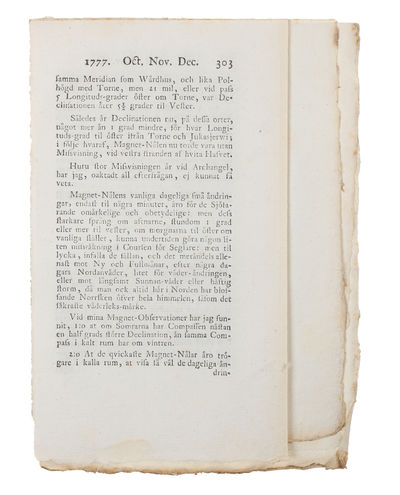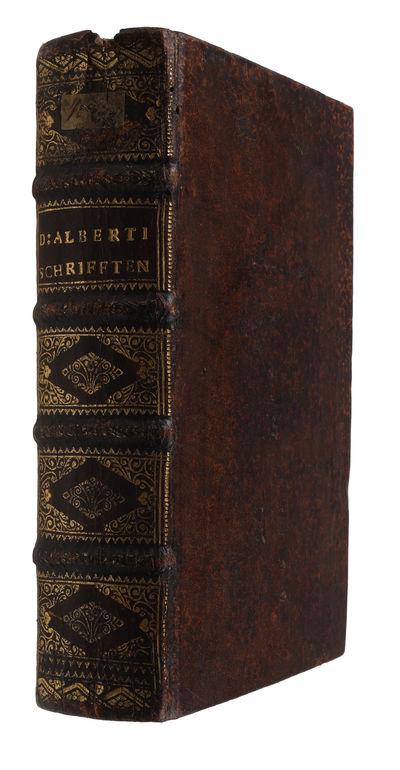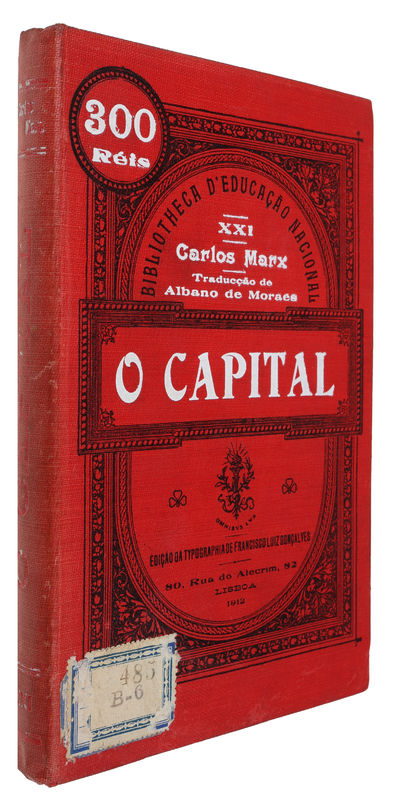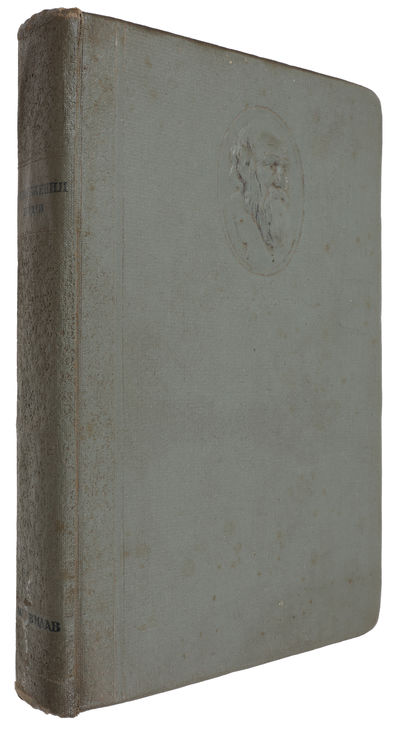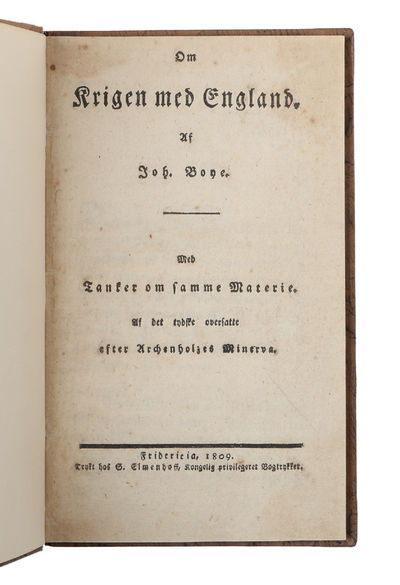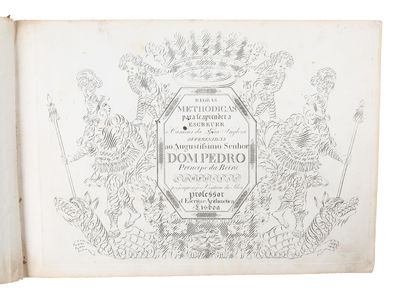[FIBIGER, MATHILDE] + [JULIUS CHRISTIAN GERSON].
Clara Raphael. Tolv Breve, udgivne af Johan Ludvig Heiberg + (Gerson:) Fem Breve til Clara Raphael fra en Ung Hustru + "Et Besøg." Nye Breve af Forfatterinden til Clara Raphael. - [THE BREAK-THROUGH OF FEMINISM IN DENMARK]
Herman H. J. Lynge & Søn A/S
lyn62307
Kjøbenhavn [Copenhagen], 1851. All three works bound together in a contemporary green half cloth binding with a large printed paper label to spine (reading "Clara Raphael). Inner hinges a bit weak. Wear to upper capital and remains of varnish to spine. First quire of Clara Raphael with a damp stain and the first two works brownspotted. Old owner's signature to front free end-paper.
Scarce first edition of the first feminist novel in Denmark, the highly controversial and influential "Clara Raphael", which is the work that sparked the battle for women's rights in Denmark. Bound together with one of the most important responses to it from the same year as well as Fibiger's "A Visit", also from 1851, which is Fibiger's defence against the many accusations against her following the publication of "Clara Raphael", directed at her women readers. Fibiger’s novel caused enormous controversy. The intellectual elite was in uproar. Within the first year of its publication, ca 25 responses to it were published in newspapers and periodicals and ca 10 brochures and pamphlets pertaining to it. The novel caused vexation in all political camps. The demands for equality between the sexes were scrutinized in all regards, and many politicians began singing the praises of “the woman of the home”. It is in this strain of thought that the famous author of children’s books, Julius Christian Gerson, wrote his significant contribution to the feud, “Five Letters to Clara Raphael from a Young Wife”, also published in 1851. Using the pseudonym “A Young Wife”, he claims, in the voice of this fictitious woman, that Fibiger’s novel had violated the female gender and that the emotions and the striving that are presented as those most pertinent for the woman, are completely foreign to the true woman. He lets his fictitious female author praise herself for being “a young mother who wishes for nothing and wishes to be nothing outside of her circle.” The debate that arose following the publication of "Clara Raphael" was very harsh indeed, and the whole public debate was hard on Mathilde Fibiger. Her views were lost on almost all notable men of the period, but she clearly needed to defend herself. Thus, in the same year, she wrote another novel, also in the form of letters, “A Visit”, in an attempt to extrapolate on her views and defend herself. This novel, however, is not written in order to persuade the men of her views, but was directed at women, who would hopefully get to understand her views better. "Clara Raphael" is the main work of feminism in Denmark and the first Danish governess novel. It founded an entirely new genre of women's novels hitherto unknown in Denmark. The work, which constitutes the break-through of feminism in Denmark, was greatly controversial and immediately caused great furore. It resulted in the so-called Clara Raphael Dispute, in which for instance N.F.S. Grundtvig defended Mathilde Fibiger. Due to the controversial contents of the work, Mathilde Fibiger published it anonymously, and only J.L. Heiberg (1791-1860, perhaps the most famous cultural persona during the Danish Golden Age. He played a more significant role than any other author or thinker during this period) is mentioned on the title-page, as the editor. No publisher had wanted to touch this highly controversial work, and it was only after the appearance of "Jane Eyre" that a publishing house dared take it on. As Mary Wollstonecraft had pioneered feminist philosophy with "A Vindication of the Rights of Women" from 1792 and argued for education as the means to liberate women, so Mathilde Fibiger surprised her Danish contemporaries with her groundbreaking novel "Clara Raphael. Twelve Letters", from 1851, in which she made the connection between the national-democratic movement and the liberation of women. With this book, which deals with the inequality of the sexes and the lack of possibility for women to develop themselves, Mathilde Fibiger became the first notable advocate of the emancipation of women in Denmark. It was not only the political controversy caused by the request of equality that made the book so extremely controversial, it was also the ability of the merely 20 year old author to clearly and precisely state and substantiate the essential problems. When reading the book, it is not difficult to see why it came to have the effect that it did, and why it caused the furor that it did. For instance, Clara Raphael, when despairing at the position of women in society, writes: "Our position in society is tragic, and why? What right does man have to suppress us? For subjugated we are, despite the chains being gilded." She understands that casting off these chains will be no easy matter, and that it will not only be a matter of politics, but also of consciousness and mindset: "When the peasants were granted their freedom, some of them wept, begging for permission to keep things as they had been." One of the beaming sentences of the novel is Clara's response to her friend when asked what she is actually fighting for: "I will fight and live for what I understand by the emancipation of women."Her hope of breaking with the existing patriarchal system of society required national and democratic self-awareness, which for her constituted a promise of freedom. In 1871, Frederik Bajer (1837-1922) and Matilde Bajer (1840-1934) founded the Danish Women's Society, the first women's organisation in Denmark. Mathilde Fibiger was one of the earliest members of the Society. When the Danish Women's Society was established, it did not demand female suffrage. It was not until 1906 that a majority of the members were in favour of making that demand the official policy of the Society. In Denmark, women were not allowed to vote in parochial church council elections until 10+3; not until 1908 were they allowed to vote in parish council and local council elections, and not until 1915 in the Folketing and the Landsting elections. It was not until then that women became fully-fledged citizens in a political sense.
Scarce first edition of the first feminist novel in Denmark, the highly controversial and influential "Clara Raphael", which is the work that sparked the battle for women's rights in Denmark. Bound together with one of the most important responses to it from the same year as well as Fibiger's "A Visit", also from 1851, which is Fibiger's defence against the many accusations against her following the publication of "Clara Raphael", directed at her women readers. Fibiger’s novel caused enormous controversy. The intellectual elite was in uproar. Within the first year of its publication, ca 25 responses to it were published in newspapers and periodicals and ca 10 brochures and pamphlets pertaining to it. The novel caused vexation in all political camps. The demands for equality between the sexes were scrutinized in all regards, and many politicians began singing the praises of “the woman of the home”. It is in this strain of thought that the famous author of children’s books, Julius Christian Gerson, wrote his significant contribution to the feud, “Five Letters to Clara Raphael from a Young Wife”, also published in 1851. Using the pseudonym “A Young Wife”, he claims, in the voice of this fictitious woman, that Fibiger’s novel had violated the female gender and that the emotions and the striving that are presented as those most pertinent for the woman, are completely foreign to the true woman. He lets his fictitious female author praise herself for being “a young mother who wishes for nothing and wishes to be nothing outside of her circle.” The debate that arose following the publication of "Clara Raphael" was very harsh indeed, and the whole public debate was hard on Mathilde Fibiger. Her views were lost on almost all notable men of the period, but she clearly needed to defend herself. Thus, in the same year, she wrote another novel, also in the form of letters, “A Visit”, in an attempt to extrapolate on her views and defend herself. This novel, however, is not written in order to persuade the men of her views, but was directed at women, who would hopefully get to understand her views better. "Clara Raphael" is the main work of feminism in Denmark and the first Danish governess novel. It founded an entirely new genre of women's novels hitherto unknown in Denmark. The work, which constitutes the break-through of feminism in Denmark, was greatly controversial and immediately caused great furore. It resulted in the so-called Clara Raphael Dispute, in which for instance N.F.S. Grundtvig defended Mathilde Fibiger. Due to the controversial contents of the work, Mathilde Fibiger published it anonymously, and only J.L. Heiberg (1791-1860, perhaps the most famous cultural persona during the Danish Golden Age. He played a more significant role than any other author or thinker during this period) is mentioned on the title-page, as the editor. No publisher had wanted to touch this highly controversial work, and it was only after the appearance of "Jane Eyre" that a publishing house dared take it on. As Mary Wollstonecraft had pioneered feminist philosophy with "A Vindication of the Rights of Women" from 1792 and argued for education as the means to liberate women, so Mathilde Fibiger surprised her Danish contemporaries with her groundbreaking novel "Clara Raphael. Twelve Letters", from 1851, in which she made the connection between the national-democratic movement and the liberation of women. With this book, which deals with the inequality of the sexes and the lack of possibility for women to develop themselves, Mathilde Fibiger became the first notable advocate of the emancipation of women in Denmark. It was not only the political controversy caused by the request of equality that made the book so extremely controversial, it was also the ability of the merely 20 year old author to clearly and precisely state and substantiate the essential problems. When reading the book, it is not difficult to see why it came to have the effect that it did, and why it caused the furor that it did. For instance, Clara Raphael, when despairing at the position of women in society, writes: "Our position in society is tragic, and why? What right does man have to suppress us? For subjugated we are, despite the chains being gilded." She understands that casting off these chains will be no easy matter, and that it will not only be a matter of politics, but also of consciousness and mindset: "When the peasants were granted their freedom, some of them wept, begging for permission to keep things as they had been." One of the beaming sentences of the novel is Clara's response to her friend when asked what she is actually fighting for: "I will fight and live for what I understand by the emancipation of women."Her hope of breaking with the existing patriarchal system of society required national and democratic self-awareness, which for her constituted a promise of freedom. In 1871, Frederik Bajer (1837-1922) and Matilde Bajer (1840-1934) founded the Danish Women's Society, the first women's organisation in Denmark. Mathilde Fibiger was one of the earliest members of the Society. When the Danish Women's Society was established, it did not demand female suffrage. It was not until 1906 that a majority of the members were in favour of making that demand the official policy of the Society. In Denmark, women were not allowed to vote in parochial church council elections until 10+3; not until 1908 were they allowed to vote in parish council and local council elections, and not until 1915 in the Folketing and the Landsting elections. It was not until then that women became fully-fledged citizens in a political sense.
Address:
Silkegade 11
DK-1113 Copenhagen Denmark
Phone:
CVR/VAT:
DK 16 89 50 16
Email:
Web:
![Clara Raphael. Tolv Breve, udgivne af Johan Ludvig Heiberg + (Gerson:) Fem Breve til Clara Raphael fra en Ung Hustru + "Et Besøg." Nye Breve af Forfatterinden til Clara Raphael. - [THE BREAK-THROUGH OF FEMINISM IN DENMARK] (photo 1)](https://d3525k1ryd2155.cloudfront.net/h/695/177/1699177695.0.l.jpg)
![Clara Raphael. Tolv Breve, udgivne af Johan Ludvig Heiberg + (Gerson:) Fem Breve til Clara Raphael fra en Ung Hustru + "Et Besøg." Nye Breve af Forfatterinden til Clara Raphael. - [THE BREAK-THROUGH OF FEMINISM IN DENMARK] (photo 2)](https://d3525k1ryd2155.cloudfront.net/h/695/177/1699177695.1.l.jpg)
![Clara Raphael. Tolv Breve, udgivne af Johan Ludvig Heiberg + (Gerson:) Fem Breve til Clara Raphael fra en Ung Hustru + "Et Besøg." Nye Breve af Forfatterinden til Clara Raphael. - [THE BREAK-THROUGH OF FEMINISM IN DENMARK] (photo 3)](https://d3525k1ryd2155.cloudfront.net/h/695/177/1699177695.2.l.jpg)
